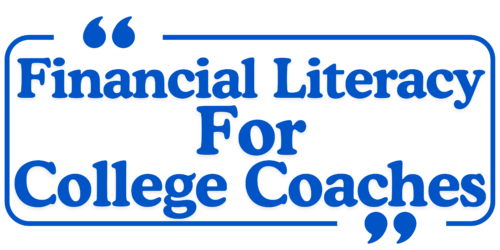Curriculum: Financial Literacy for Coaching Staff
This curriculum is designed to empower coaching staff with essential financial knowledge and skills. It covers various aspects of personal finance, enabling coaches to make informed financial decisions that enhance their overall well-being and professional success.
Module 1: Introduction to Financial Literacy
Learning Objectives:
- Define financial literacy and its significance for coaching staff.
- Understand the importance of financial planning and management.
- Assess current financial knowledge and identify areas for improvement.
Topics Covered:
- What is Financial Literacy? Key Concepts
- The Role of Financial Literacy in Personal and Professional Success
- Self-Assessment: Evaluating Your Financial Knowledge
- Setting Financial Goals: Short-term and Long-term Objectives
Module 2: Budgeting Basics
Learning Objectives:
- Learn how to create and maintain a personal budget.
- Understand the importance of tracking income and expenses.
- Develop skills to make informed spending decisions.
Topics Covered:
- The Budgeting Process: Steps and Best Practices
- Identifying Fixed and Variable Expenses
- Tools and Apps for Budgeting
- Strategies for Sticking to Your Budget
Module 3: Understanding Income and Compensation
Learning Objectives:
- Gain insights into different compensation structures in coaching.
- Understand the components of a coaching contract.
- Learn how to negotiate compensation effectively.
Topics Covered:
- Salary, Bonuses, and Benefits: What to Expect
- Key Terms in Coaching Contracts: Understanding Your Agreement
- Negotiation Techniques for Coaches
- Evaluating Compensation Packages: What to Look For
Module 4: Saving and Emergency Funds
Learning Objectives:
- Understand the importance of saving for short-term and long-term goals.
- Learn how to build and maintain an emergency fund.
- Explore different savings vehicles and strategies.
Topics Covered:
- The Importance of Saving: Setting Financial Priorities
- How Much Should You Save? Guidelines for Building an Emergency Fund
- Savings Accounts vs. Other Savings Options
- Tips for Increasing Your Savings Rate
Module 5: Basics of Investment
Learning Objectives:
- Learn the fundamentals of investing and its role in wealth building.
- Understand different types of investment vehicles.
- Assess personal risk tolerance and investment goals.
Topics Covered:
- What is Investing? Key Concepts and Terminology
- Types of Investments: Stocks, Bonds, Mutual Funds, and ETFs
- The Power of Compounding and Time in Investing
- Building an Investment Portfolio: Diversification Strategies
Module 6: Retirement Planning
Learning Objectives:
- Understand the importance of retirement planning for coaching staff.
- Learn about different retirement savings options available to coaches.
- Develop a personalized retirement savings plan.
Topics Covered:
- Retirement Basics: Why Planning Matters
- Understanding Retirement Accounts: 401(k), IRA, and Others
- How Much Should You Save for Retirement?
- Strategies for Maximizing Retirement Savings
Module 7: Tax Planning Essentials
Learning Objectives:
- Gain knowledge about tax obligations and planning strategies.
- Understand deductions and credits available to coaching staff.
- Learn how to prepare for tax season.
Topics Covered:
- Overview of Income Tax: How It Works
- Common Deductions for Coaches: Travel, Education, and More
- Tax Credits: Understanding Eligibility and Benefits
- Tips for Organizing Financial Records for Tax Preparation
Module 8: Insurance Literacy
Learning Objectives:
- Understand different types of insurance and their importance.
- Learn how to evaluate insurance needs and coverage options.
- Develop a plan for managing risk through insurance.
Topics Covered:
- Types of Insurance: Life, Health, Disability, and Liability
- Assessing Your Insurance Needs: What Coverage is Essential?
- Shopping for Insurance: Comparing Policies and Rates
- Managing Risks and Protecting Your Income
Module 9: Estate Planning Basics
Learning Objectives:
- Understand the importance of estate planning for coaching staff.
- Learn about wills, trusts, and other estate planning tools.
- Develop a basic estate plan that aligns with personal goals.
Topics Covered:
- What is Estate Planning? Key Concepts and Terminology
- The Role of Wills and Trusts in Estate Planning
- Powers of Attorney and Healthcare Directives
- Reviewing and Updating Your Estate Plan
Module 10: Final Assessment and Action Plan
Final Assessment: Participants will create a personalized financial action plan based on the knowledge gained throughout the course.
Certification: Upon completion, participants will receive a certification in Financial Literacy for Coaching Staff, empowering them to make informed financial decisions and enhance their financial well-being.
This Financial Literacy for Coaching Staff curriculum equips coaches with the essential knowledge and skills to effectively manage their finances, enabling them to focus on their professional roles while ensuring their financial stability and growth.
